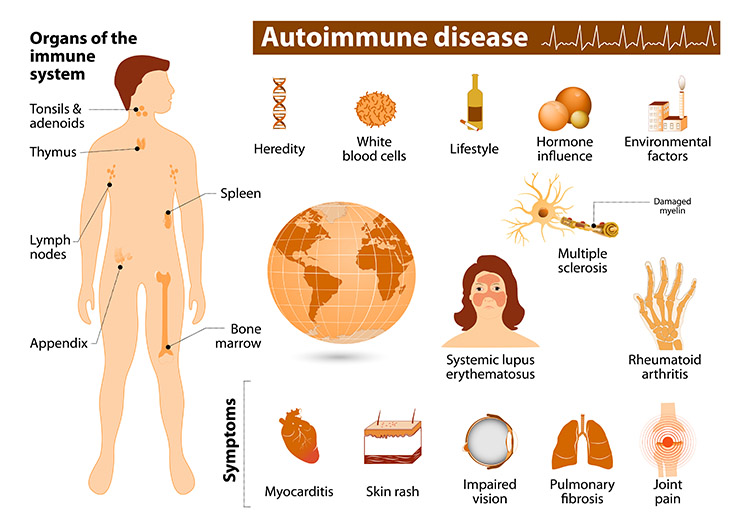Understanding Immunological Disorders
Immunological Disorders
1.Autoimmune Diseases:
Autoimmune diseases represent a complex group of disorders characterized by the immune system's misguided attack on the body's own tissues and organs.
In these conditions, the immune system fails to distinguish between self and non-self antigens, leading to chronic inflammation, tissue damage, and dysfunction. Rheumatoid arthritis, systemic lupus erythematosus, type 1 diabetes, and multiple sclerosis are among the many autoimmune diseases that can affect virtually any part of the body.
While the precise etiology of autoimmune diseases remains incompletely understood, a combination of genetic predisposition, environmental triggers, and dysregulated immune responses is thought to contribute to their development.
Current treatment approaches typically focus on alleviating symptoms and suppressing aberrant immune activity, often through the use of immunosuppressive medications.

2.Immunodeficiency Disorders :
Immunodeficiency disorders encompass a group of conditions characterized by weakened or dysfunctional immune responses, rendering individuals more susceptible to infections, malignancies, and other health complications.
These disorders can arise from genetic mutations affecting components of the immune system, acquired conditions such as HIV/AIDS, or as a result of medical treatments such as chemotherapy or immunosuppressive drugs.
Primary immunodeficiencies, present from birth, often manifest early in life with recurrent or severe infections. Secondary immunodeficiencies, on the other hand, develop later in life and can be caused by factors such as malnutrition, chronic diseases, or certain medications.

3. Allergies and Hypersensitivity Reactions :
Allergies and hypersensitivity reactions are immune-mediated responses to normally harmless substances, known as allergens, triggering exaggerated immune responses.
These reactions can range from mild to severe and affect various organs and systems, including the skin, respiratory tract, and gastrointestinal tract. Common allergens include pollen, pet dander, foods, medications, and insect venom.
Allergic reactions can manifest as hay fever, asthma, hives, or anaphylaxis, depending on the individual's sensitivity and the route of exposure to the allergen. Hypersensitivity reactions are classified into four types (Type I to IV) based on the underlying immune mechanisms.
Type I hypersensitivity reactions, mediated by immunoglobulin E (IgE), are responsible for immediate allergic responses, while other types involve different immune pathways and timelines.

4. Cancer Immunology :
Cancer immunology is a rapidly evolving field focused on understanding the interactions between the immune system and cancer cells.
The immune system has the potential to recognize and eliminate cancer cells through a process known as immune surveillance.
However, cancer cells can develop various mechanisms to evade immune detection and suppression, leading to tumor progression and metastasis. Cancer immunology research aims to elucidate these immune evasion mechanisms and develop immunotherapies to enhance the body's immune response against cancer.

For more information on Immunological Disorders here is an explanatory video:
